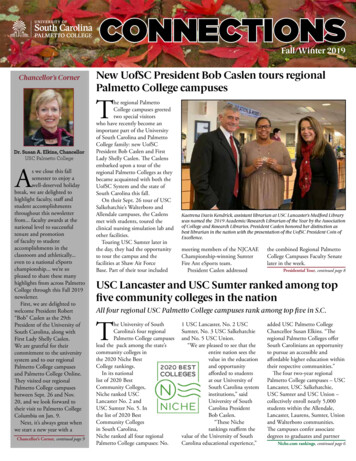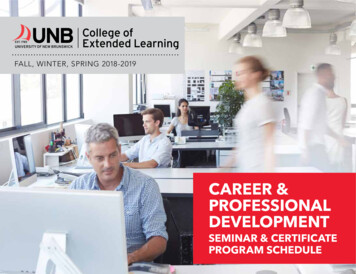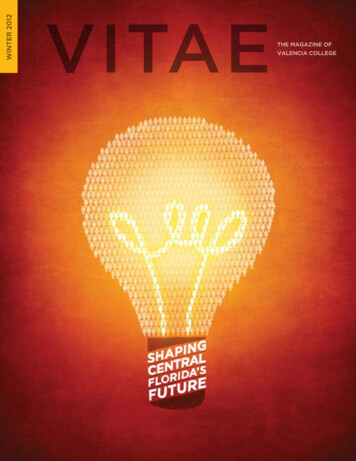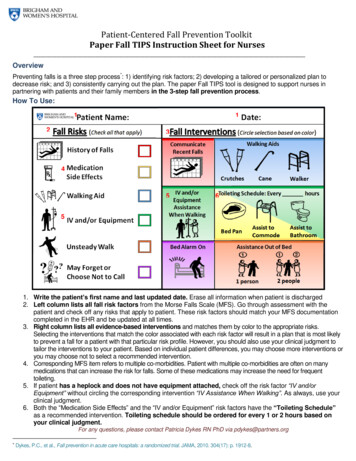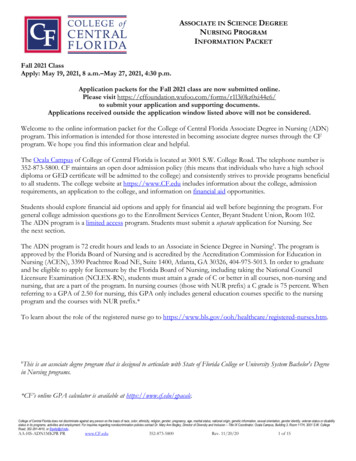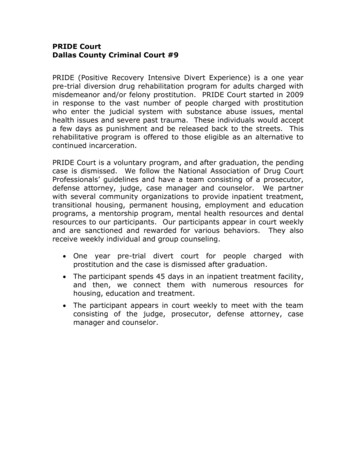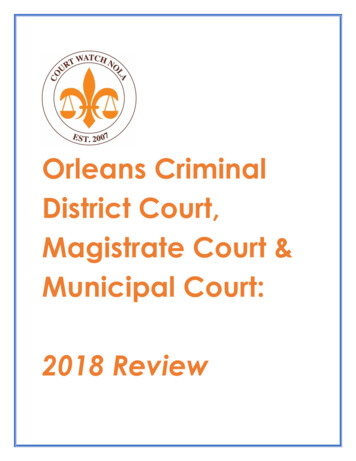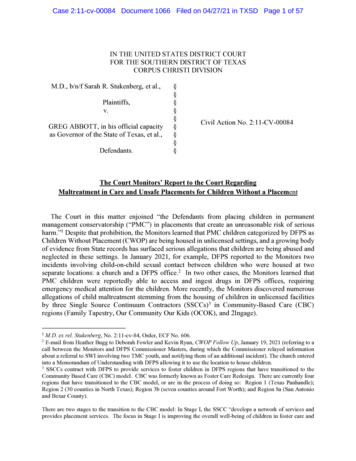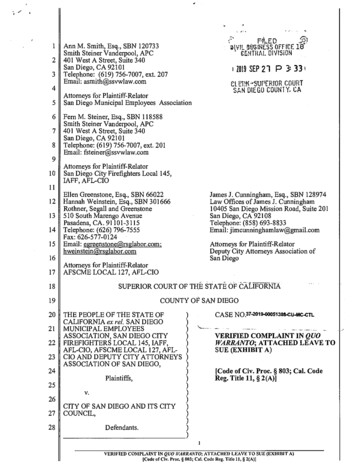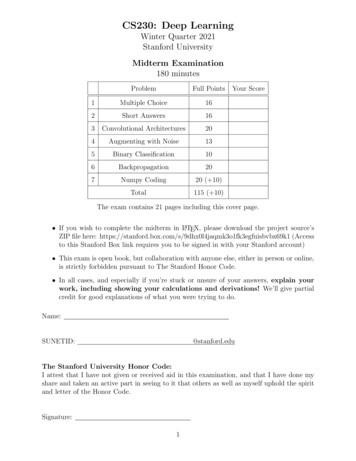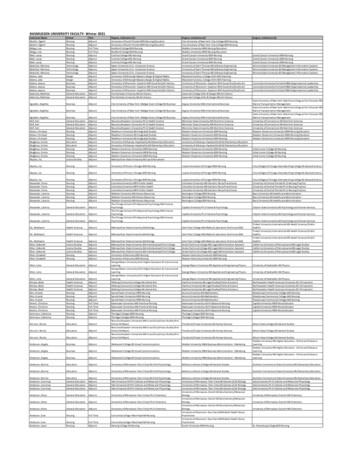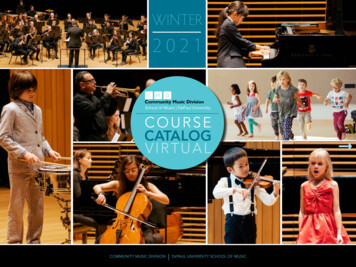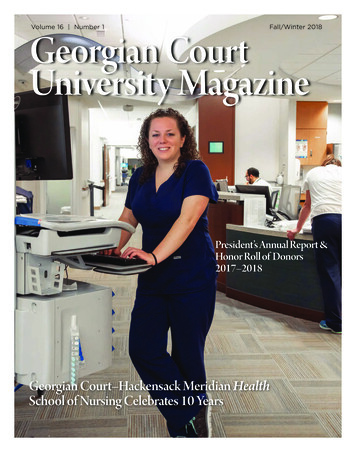
Transcription
Volume 16 Number 1Fall/Winter 2018Georgian CourtUniversity MagazinePresident’s Annual Report &Honor Roll of Donors2017–2018Georgian Court–Hackensack Meridian HealthSchool of Nursing Celebrates 10 Years
From the PresidentDear Alumni, Donors, Students, and Friends:Happy New Year! The holiday season is behind us, but the activitiesand accolades of 2018 still give us to plenty to celebrate. That is whythis edition of GCU Magazine is packed with examples of good newsworth sharing—with you and with those you know.First, the Georgian Court–Hackensack Meridian Health Schoolof Nursing is celebrating its 10-year anniversary. Our first decadehas produced successful health care professionals serving patientsfrom coast to coast, and the program is among the fastest growingat GCU.In this issue of the magazine, I’d like you to meet twounforgettable alumni. Florence “Riccie” Riccobono Johnson ’45(pp. 28–29) has worked at CBS for more than six decades and reflects on her time at 60 Minutes, whereshe’s been employed since 1968. Gemma Brennan ’84, ’93 (pp. 6–9), a longtime teacher, principal, andpart-time GCU professor, is sharing her passion in unique ways.Likewise, our newest honorary degree recipient, His Royal Highness The Prince Edward, Earl ofWessex, shared his passion for court tennis during a September visit to GCU (p. 13). Georgian Court wasat its absolute finest as the prince met students, faculty, staff, and coaches, and played several matchesin the Casino.A few weeks later, I was proud to see alumni join in the fun of Reunion and HomecomingWeekend 2018 (p. 24) and happy to accept more than 103,000 in scholarship funds from the Class of1968 as they honored Mary Arthur Beal, RSM, ’55 (back cover). Graduates also enthusiastically acceptedthe challenge of increasing alumni giving to 10 percent by 2020.We are always grateful for your contributions, and our 2017–2018 annual report confirms yourongoing generosity. Most recently, you helped us exceed our one-day Giving Tuesday goal by raisingmore than 93,000 on November 29 (inside back cover).I am also pleased to share with you news of our enrollment gains and continued growth. In August,we saw a 21 percent increase in freshmen, and their average GPA and SAT scores are higher thanprevious years. We also welcomed our largest University Honors Program class to date!Our GCU@Cumberland social work program is thriving, two new health-focused undergraduatedegrees were added this fall (p. 19), and our first doctoral program will launch later this year.All of this is happening as we begin to implement our Strategic Compass . . . for an Even BetterTomorrow. This new strategic plan will direct our efforts to fulfill our mission for the foreseeable future.I invite you visit georgian.edu/strategic-compass to read it.With your support, the coming months will bring new opportunities for us to do more of what wedo best—providing access to a quality college education and positioning students for lifelong success.Go Lions!Joseph R. Marbach, Ph.D.President, Georgian Court UniversityP.S. Connect with me on Twitter at @DrJosephMarbachOn the cover: Amanda Spengler ’15 at Jersey Shore University Medical Center
GEORGIAN COURTUNIVERSITY MAGAZINEFALL/WINTER 2018VOLUME 16 NUMBER 1Georgian CourtUniversity MagazineJoseph R. Marbach, Ph.DUniversity PresidentPresident’s Annual Report & Honor Roll of Donors 2017–20182Gail H. TownsManaging EditorExecutive Director of Marketingand CommunicationsTHE BEST OF HEALTHThe Georgian Court–HackensackMeridian Health School of Nursingcelebrates a decade of nursingeducation excellence this fall.Tara M. StricklandEditorAssistant Editorial DirectorRichard BerardiMultimedia ProducerWeb Administrator6DesignBarbara A. HillPhotographersSteve BelkowitzRichard BerardiTyler Chamra ’18Jim ConnollyRuss DeSantisLaura Egles ’14GCU AthleticsDan MassaDenise MettaPhyllis SchiavoneAlicia A. SmithGail H. TownsJaelyn Tweedy ’18ContributorsShakyya Alford-Cole ’18Robert E. ConstantKristen FischerMichelle GilesMichele Hujber, APRSanford JosephsonSamantha Mancino ’16Christopher McKibbenToniAnn McLaughlinTiffany Monte ’18Gwen MoranTara M. StricklandGail H. TownsJudy Ward, RSM, ’67ALUMNA AND ADJUNCTPROFESSOR GEMMA BRENNANDELIVERS LESSONS FOR LIFEFormer principal and longtimeGCU adjunct Gemma Brennan,Ed.D., ’84, ’93 dishes up lessons onlife, effective teaching, and what itmeans to be a good human being.IN EVERY ISSUE10Faculty12Student13At The CourtPresident’s Annual Report & Honor Roll of Donors 2017–201825Athletics28AlumniBeauty Queen: Georgian Court Alumna Has Made Up Stars forMore Than 50 YearsClass NotesAnnouncementsGeorgian Court University Magazineis published biannually by theOffice of Public Information andUniversity Communications.phone: 732.987.2291e-mail: GCUNews@georgian.eduGEORGIAN COURT UNIVERSITY MAGAZINE 1
THEBEST OFHEALTHGeorgian Court–HackensackMeridian Health School of Nursingcelebrates a decade of nursingeducation excellence.By Gwen MoranAmanda Spengler ’15 was only at Georgian Court University’sNursing Open House because her parents convinced her to go. Ms. Spengler knewshe wanted to be a nurse, but she was looking at schools farther from her hometownof Howell Township—perhaps in other parts of New Jersey or even Pennsylvania. Butonce she met the welcoming faculty and saw all that The Court’s nursing program hadto offer, she knew the program was exactly what she was seeking.“They told us how they worked hand-in-hand with students. They were just soamazing, and they made me feel so welcome,” she says. “Georgian Court went fromlast choice to first in one Open House. I’ve never regretted the decision.”This year, the Georgian Court–Hackensack Meridian Health School of Nursingcelebrates its 10th year. Including its inaugural 30-person graduating class in 2012,272 students have received their nursing degrees from the program as of May 2018.This makes nursing the largest major in the GCU School of Arts and Sciences.2 F A L L / W I N T E R2 0 1 8GCU Nursing by the Numbers30 2012 graduating class52 2018 graduating classFall 2018 Class39 First-time, full-time freshmen56 Full-time transfer students16 Part-time transfer students
Ms. Spengler, now a nurse at Jersey Shore University MedicalCenter in Neptune, was part of the program’s fourth graduatingclass and a recipient of the Johnson & Johnson Discover NursingScholarship through the Independent College Fund of New Jersey(ICFNJ). She says the small class sizes and personalized attentionshe received from faculty made a real difference in her nursingeducation. While some other universities have hundreds ofstudents, she liked her 30-person cohort. She says she also foundprofessors readily available when she needed them.“The faculty was so knowledgeable and caring toward eachstudent. They went out of their way to be sure everyone feltcomfortable in every subject. They tried their best so no one wouldget left behind,” she says.Building a Program—ProntoWhen Nursing Program Chair Teri Wurmser, Ph.D., MPH, RN,NEA-BC, thinks back on the program’s beginning, she recallsa frenetic pace at the outset. She and Associate Provost forAcademic Programs Michael Gross, Ph.D., created the programin less than a year—no small feat for their team. From the start,the nursing program’s partnership with Hackensack MeridianHealth (formerly Meridian Health) was crucial to its success. Themedical system provided faculty members and provided advisorsand insight to ensure the program would meet a high standard ofnursing education.Amanda Spengler ’15 is a float nurse at Hackensack Meridian Health’sJersey Shore University Medical Center in Neptune, where she’s workedsince graduating from the program.GEORGIAN COURT UNIVERSITY MAGAZINE 3
Rebecca “Becca” Wishbow ’12 appreciates being able to take her nursingcredentials to California while her husband attends law school.Millstone native Rebecca Wishbow ’12 was a member of thenursing school’s first graduating class and a recipient of the C. R.Bard Foundation Nursing Scholarship through the ICFNJ. Sherecalls being nervous about being part of a new program—so new,in fact, it had not even received its accreditation.“But it ended up being the best nursing school experiencebecause they were so hands-on with us,” she says.She says the relationship with Hackensack Meridian Healthwas a key component of the program’s strength and gave her animmediate network of contacts in her field.“While I was in the program, I was a nursing assistant. Theyhelped me set that up. In our clinicals, we were able to makeconnections with managers and educators. By the time I graduated,it was fairly easy to reach out to people and secure a job,” she says.Ms. Wishbow now works at Sharp Grossmont Hospital inLa Mesa, California, while her husband goes to law school nearby.In Spring 2019, the couple plans to return to New Jersey, but sheappreciates the portability of her career choice.Hackensack Meridian Health Co-CEO John K. Lloyd, whoretired at the end of 2018, says he couldn’t be prouder of thepartnership between Georgian Court and the health network.“It’s amazing to think about what’s been accomplished over the past10 years. When creating this partnership, we set out to help addressthe nursing shortage in New Jersey and nationwide and improvethe health of the communities we serve,” he says. “Considering thehundreds of people who have received their nursing degrees locallythrough this program, there’s no doubt we have moved the needle.And it’s only going to continue to grow.”4 F A L L / W I N T E R2 0 1 8Growing Opportunities for NursesIndeed, the program has grown, and not just in the numberof students it serves, but also in its offerings. Students haveopportunities to participate in international trips and volunteertheir nursing skills, gaining hands-on experience in some of theareas that need it most. In January 2019, nursing students traveled toPeru, volunteering in the rural villages outside Cusco where peopledon’t typically have access to regular health care. In 2018, nursingstudents took part in a trip and volunteered in a clinic in CiudadSandino, Nicaragua.Georgian Court’s nursing program also offers researchopportunities. Efthimia Stefanou ’16, from Oakhurst, comparedmale endurance athletes—such as marathon runners and cyclistswho exercise at least two hours four times per week—to menin the general population to explore health-related quality oflife differences between the two groups. Her work discovered asignificant decline in testosterone among the athletes. She and herfaculty advisor Jo Ann Cummings, Ph.D., RN, PPCNP-C, BCEN,assistant professor of nursing, also wrote and published an article onthe research.“She was a great mentor; she saw potential in me before I saw itin myself,” says Ms. Stefanou.Dr. Cummings also spearheaded the successful efforts of theGCU Meridian Nursing Honor Society to become an officiallyrecognized chapter of Sigma Theta Tau International. After severalyears of work, Dr. Cummings and student Brigid Joyce were happyto see this accomplishment come to fruition in Spring 2018.
Junior Jacob Adler and sophomore Erin O’Neill learn fromDr. Jo Ann Cummings.The goals of the Psi Psi Chapter, according to its foundationaldocuments, are “to fulfill the mission and values of the honor societyto give back to build leaders, to give back to the profession, and togive back to the community.” The chapter gives nursing students yetanother venue to access career assistance, professional resources,and networking opportunities.Meeting Student and Community NeedsThe close collaboration that drove the formative years of the nursingprogram continues to be its guiding voice, Dr. Gross says. Thenursing faculty are involved with leadership and advisory groups,gathering insight from other nursing program leaders. Many workfor Hackensack Meridian Health and have firsthand insight into theneeds of the community and the changing demands of nursing.“They are very on top of what’s happening right now in nursing,and how they can position Georgian Court to meet the needs ofemployers, and also current trends in nursing education,” he says.Dr. Wurmser agrees. Input from the leadership team led tokey changes to the program. The program was modified toteach students about quality care practices and their impact oncompensation mandated by the Affordable Care Act. The programhas also made additions to meet the needs of various communitymembers. In November 2017, the program introduced the RNto B.S.N. program, both at Riverview Medical Center andGCU@Hazlet, making a B.S.N.—the gold standard of theprofession—more accessible for working nurses. Students withan associate degree can enter the accelerated B.S.N. program. TheNew Seminary, a unique B.S.N. program, was created for OrthodoxJewish women in the Lakewood community.The partnership with Hackensack Meridian Health alsoallows student nurses to obtain experience in a variety of settings.Because the health care system manages such a wide range of healthcare facilities in a variety of disciplines, nursing students can gethands-on experience in many different types of clinical settingsand disciplines.“There’s a lot you can learn from a textbook, but nothingcompares to hands-on experience,” says Mr. Lloyd. “Through ourstrong partnership, we’ve been able to consistently get nursingstudents into the clinical setting and learning from the bestMagnet-certified Hackensack Meridian Health nurses.”Clinical nursing faculty celebrate the first Sigma induction:Deborah Kennard, Ph.D., assistant professor; Teri Wurmser, Ph.D.,program chair; Maureen Bailey, Ph.D., assistant professor; JenniferBradle, lecturer; Jo Ann Cummings, Ph.D., assistant professor; andKathryn E. Fleming, Ph.D., associate chair (left to right).GEORGIAN COURT UNIVERSITY MAGAZINE 5
Alumna andAdjunct ProfessorGemma BrennanDeliversLESSONS FOR LIFEBy Gail H. TownsGemma Brennan, Ed.D., ’84, ’93 is in her Manchesterkitchen, preparing lasagna for the more than15 people waiting in her living room and dining room.Tonight, the former principal, longtime GCUadjunct professor, dedicated donor, and belovedvolunteer is serving up food for the soul. But it’s notabout what is on the menu. Rather, she’s dishing uplessons on life, effective teaching, and what it means tobe a good human being.“When it comes to education, I focus ondifferentiated instruction,” says Dr. Brennan, now inher 19th year of part-time teaching at Georgian Court.“It comes down to how you go about helping everychild learn to be his or her best; how you positionthem to serve the world.”“As teachers, ask yourselves this,” she says to thegroup. “How can you help your student evolve into acitizen who will do good for the next generation?”For some, this end-of-semester meal is the finaltime they will be together before they head into thereal world. Their instructor, however, wants to makesure they are fully equipped for work.“Our last class is always memorable for me,” saysDr. Brennan, “and it is a time to get to know themjust a little more. GCU is a most remarkableuniversity, and the students gain so much. It is thepeople of GCU who make it truly a special place witha very human touch.”6 F A L L / W I N T E R2 0 1 8
ReStart the Arts, held on April 21, 2018, was a fund-raiser for Ocean Academyrun by GCU student volunteers, including Elizabeth “Liz” Weidenhof ’18;Ashley Quinby ’18; Rebecca Scharen, lead organizer; Katherine Stabile ’18;Mindi Makovec ’18; and Jessica Singer ’18 (left to right).Upper-level pre-service teachers gather each semester at thehome of Dr. Brennan.GEORGIAN COURT UNIVERSITY MAGAZINE 7
This is classic “Gemma,” as she is called by her Georgian Courtstudents. She leads them in upper-level teacher preparationcourses, which they complete just before heading into localclassrooms for their internships.What they learn from her will be remembered as they becometeachers. And so will Dr. Brennan’s personal story of resilience andpassion for the profession.“I was 20 years old when I got married, and we had threechildren by the time I was 26,” she says. “I had two years of college,but stopped to raise my family. I waitressed to support the children’sactivities—soccer registration, shoes—and I ran a playgroup threedays a week in my basement. That paid my tuition to go back toschool at night at Georgian Court.“However, no one gets a degree alone,” she says, adding that herfirst husband, Don, was her greatest cheerleader. “The same could besaid for our own parents, my children, and my neighborhood friendsin Silverton.”A great sadness for Gemma is that Don provided loving supportthroughout her career, but sadly did not live to experience thesuccess she has seen in the last 10 years.After graduating in 1984 at age 35, she landed her first teachingjob in Toms River. Her GCU advisor, associate professor emeritusof education Joseph Cino, Ed.D., told her to keep going. A master’sdegree (also from GCU) followed in 1993, and later, a doctoraldegree from Seton Hall University. She also had ongoing supportfrom mentor Mary Lee Batesko, Ed.D., GCU professor emerita ofeducation, who has been in her life “every year,” she says, since 1984.Over 30 memorable years in public education, she was afourth-grade teacher, a school supervisor responsible for elementaryscience curriculum, and a principal. Now, she shares what shelearned along the way.“In a year, a teacher can easily spend more than 900 hours withstudents. Many of mine were spent on the playground, interactingwith students and having teacher conversations during kickball,on the monkey bars, and while jumping rope,” Dr. Brennan recalls.“I didn’t see it coming—me teaching the teachers—but time hasallowed me to have these different experiences.“My university students look at me and say, ‘You’re a mom, agrandma of nine, you’ve been a waitress, and you know what it’s liketo go to school at night to become a teacher.’ What it comes down tois that I am in constant service to our students at GCU,” she says.As expected, Dr. Brennan covers emerging pedagogy, tried andtrue classroom techniques, and official theories of education.In addition, she loves bringing her lessons to life—real life.For example, as an active volunteer with the Toms River FamilyHealth and Support Coalition, she saw an opportunity for GCUstudents to understand the difficulties some youngsters face.“I expose them to real people, real resources,” she says.“University students need to know that there are children who arehomeless, and they need to hear those children’s voices.”She invited a local mother, who was homeless at the time, toaddress the class. The experience was unforgettable.“Pre-service teachers need to know that when a child walks intothe classroom and they haven’t seen them in 12 hours, a lot couldhave happened,” Dr. Brennan explains. “When a parent loses a joband the family has to move, you have to understand what that meansin the life of a child.“When there isn’t enough food in the house, or when there isn’tpaper to do homework, or when there are no pencils in the house,”Lisa Gallegos is a teacher at Walnut Street Elementary School in Toms River andis pursuing an M.A. in Applied Behavior Analysis from GCU. She volunteers eachsemester to talk with Gemma’s students.8 F A L L / W I N T E R2 0 1 8
she says, “that translates to the classroom.”The same lesson applies when a child’s parent is in jail anddoesn’t want to use their last name because they are embarrassed. Orwhen clothing is an issue, and a family doesn’t have what it takes toget through a New Jersey winter.“These are things that matter,” says Dr. Brennan. “As ateacher, you have to have a heart for students inside and beyondthe classroom.”Scott Corbett ’00, ’03, who earned undergraduate and graduatedegrees at GCU, believes that sense of heart is exactly whatmakes Dr. Brennan unique—and effective.“Her connection to people motivates students, faculty, andcommunity leaders,” says M
their nursing skills, gaining hands-on experience in some of the areas that need it most. In January 2019, nursing students traveled to Peru, volunteering in the rural villages outside Cusco where people don’t typically have access to regular health care. In 2018, nursing students
